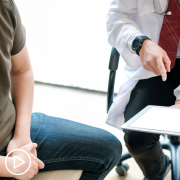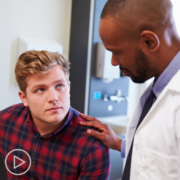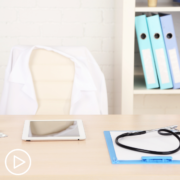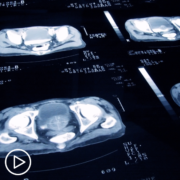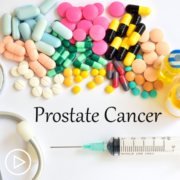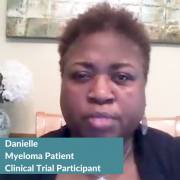Myelofibrosis Clinical Trial Participation | How Does It Move Research Forward?
Myelofibrosis Clinical Trial Participation | How Does It Move Research Forward? from Patient Empowerment Network on Vimeo.
How do clinical trials move myelofibrosis research forward? Expert Dr. Gabriela Hobbs discusses the purpose of clinical trials, factors that may impact participation, and how trials can benefit patients.
Dr. Gabriela Hobbs is a hematology-oncology physician specializing in the care of patients with myeloproliferative neoplasms (MPN), chronic myeloid leukemia and leukemia. Dr. Hobbs serves as clinical director of the adult leukemia service at Massachusetts General Hospital. Learn more about Dr. Gaby Hobbs.
See More from Evolve Myelofibrosis
Related Resources:
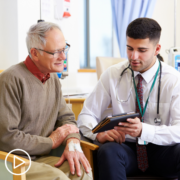
Evolving Myelofibrosis Treatment Options: What You Should Know |

|

Considering a Myelofibrosis Clinical Trial? Questions You Should Ask |
Transcript:
Katherine:
Dr. Hobbs, a key part of research moving forward is the clinical trial process. Can you talk about the benefits of patient participation?
Dr. Hobbs:
Yeah, so I think to answer that question, I should preface that by saying that I conduct clinical trials, and so certainly my answer is going to have that as a bias, so it’s important to know that. And I tell my patients that as well when I’m talking to them about clinical trials. Now, why do I think clinical trials are beneficial? Well, there’s really no way to advance the field without the sacrifice that patients do by allowing us to conduct clinical trials.
Without clinical trials, we cannot get drugs approved. Without new drugs, we certainly can’t help our patients anymore with newer therapies. That being said, a clinical trial is something that is not just an experiment. Many times patients will be like, well, I don’t want to be a guinea pig. And I completely respect that.
So, I think it’s really important to recognize too, that we take conducting clinical trials very, very seriously. The machinery that needs to exist in each hospital to conduct trials includes a ton of people. So, we have a lot of regulatory bodies, both within the hospital and outside of the hospital, to ensure that clinical trials are conducted in an ethical and in a safe way. So, one of the benefits, which you may not consider when you’re contemplating participating in a trial, is that your care team actually becomes much larger. You’re much more closely scrutinized actually, when you’re a member of a trial.
So, whereas before you would have just primarily seen me and my nurse practitioner, when you participate in a clinical trial, all of a sudden you have all these research nurses that are calling you, checking in with you, making sure you’re feeling well, et cetera. So, that’s actually a nice perk to participating in trials. So, an important thing to know with clinical trials is that they may not benefit everybody.
And that not every clinical trial may be right for you and that there may be times when trials are appropriate and times where trials may not be appropriate. So, it’s not a decision that you make that’s black and white and that’s a decision that you make forever. I think it’s something that you can continue to discuss with your care team as you go through having this disease.







